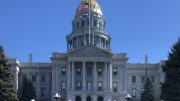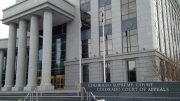By Jeffrey A. Roberts
CFOIC Executive Director
What does last week’s U.S. Supreme Court ruling on social media mean for Colorado’s 2023 law that lets elected officials block people from their private accounts “for any reason”?
Two lawyers who have sued public officials over social media blocking told the Colorado Freedom of Information Coalition the SCOTUS decision, while vague in some respects, seems to allow for certain circumstances under which someone could pursue a claim against a Colorado elected official, despite what the state statute says.
“From my perspective, this law is still a constitutional problem and something I think will eventually be challenged in court,” said Denver attorney Andy McNulty, who filed a federal lawsuit last year against then-Denver school board member Auon’tai Anderson on behalf of parent Eve Chen.

When Gov. Jared Polis signed House Bill 23-1306 into law last June, he warned elected officials not to “view the presence of this statute as a safe harbor for the activity allowed under this law” due to the Supreme Court’s impending action on the matter.
The law, believed to be the only one of its kind when it passed, declares that a private social media account administered by a state or local elected official or their designee “does not create a public forum.” Defining private social media as “not supported by the resources” of government and not required by “law, ordinance or regulation,” it lets state and local elected officials or their designees “restrict or remove a user” from their private accounts “for any reason, including bullying harassment or intimidation of other users.”
But in Lindke v. Freed, the Supreme Court justices unanimously established a two-prong test for determining when a public official has “engaged in state action” and can be sued for deleting comments and blocking critics: 1) if the official possessed “actual authority” to speak for the government and 2) if the official “purported to exercise that authority” by speaking on social media.
A defendant, like the Michigan city manager in Freed who posted about city business on a personal Facebook account, “must have actual authority rooted in written law or longstanding custom to speak for the State,” the opinion says. “That authority must extend to speech of the sort that caused the alleged rights deprivation.”
“Another way of looking at this is, are public officials going to be allowed to make an end run around their First Amendment obligations just by using private social media accounts?” said Katie Fallow, senior counsel at Columbia University’s Knight First Amendment Institute, which sued former President Trump over his practice of blocking Twitter (now X) users. “It seems like the Colorado statute says yes. But under the Supreme Court’s decision, it’s maybe.”
Fallow and McNulty said it’s not perfectly clear how the SCOTUS ruling affects an elected official — like a state legislator or a school board member — who blocks someone from a personal social media account that the official uses to post thoughts and information about official business. Is that official considered a “state actor” who speaks for the government when using a private account in that way?
“It’s such a muddy distinction,” McNulty said. “Let’s look at a legislator. That person is both, at the same time, campaigning and governing. So when they speak out about a bill they’re proposing, are they speaking out as a person running for office or are they speaking out as a legislator who has been conferred with authority by the government to talk about bills? That’s their entire job, right?”
Both lawyers noted the opinion’s second-to-last paragraph, which discusses the perils of a public official blocking people from a social media account that mixes personal and official business.
“If page-wide blocking is the only option,” the justices wrote, “a public official might be unable to prevent someone from commenting on his personal posts without risking liability for also preventing comments on his official posts. A public official who fails to keep personal posts in a clearly designated personal account therefore exposes himself to greater potential liability.”
That means, “if you’re using your account in a mixed way,” McNulty said, “you could probably remove peoples’ posts from your personal posts. But the court says you can’t just block them wholesale from the entire account, which is what a lot of public officials are doing.”
The Supreme Court’s test is “complicated,” Fallow added. “You’re going to have to look at each post to see whether that was one that prompted the blocking.”
The federal lawsuit McNulty filed last September alleges that Anderson violated Chen’s First Amendment rights by keeping her from viewing and posting on his Facebook page. The suit also faults Denver Public Schools for failing to address “the free speech implications of viewpoint-based discrimination on social media by public officials.”
DPS is now considering a new social media policy that would prohibit board members from blocking people or deleting comments from their official accounts based on someone’s viewpoint.
Follow the Colorado Freedom of Information Coalition on Twitter @CoFOIC. Like CFOIC’s Facebook page. Do you appreciate the information and resources provided by CFOIC? Please consider making a tax-deductible donation.




